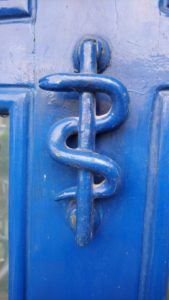


Asclepius the Greek God of Medicine
Asclepius was the Greek God of medicine who was also appropriated by the Romans. According to mythology, he was the son of the god Apollo and a mortal woman called Coronis. Fickle as the Greek gods commonly were, Apollo killed Coronis for being unfaithful but, according to some versions, the unborn child was cut from her womb as she lay on the funeral pyre.

The rod of Asclepius on the front door of the Corner Surgery clinic in Camberwell
Reared by the centaur Chiron, who is also inextricably linked with medicine and healing, Asclepius acquired skills that enabled marvellous feats of healing and even bringing people back from mortal threats and death itself. Alarmed by the imbalance this might create in the world, Zeus killed him with a thunderbolt.
Isola Tiberina, which is the only island in the part of the Tiber river that runs through Rome, is associated with Asclepius. During an outbreak of plague in the third century BC, a temple to the Greek god was built on the island. Ever since, this tiny island has retained a strong link to healing and medicine with a hospital dating back to the sixteenth century that still functions today, a basilica dating to the tenth century, and an obelisk to mark the mast of the ship in which a statue of Asclepius was carried to Rome from Greece.

Isola Tiberina in Rome, the site of an ancient temple to Asclepius
The symbol most closely associated with the god is the rod of Asclepius, which is a long shaft with a serpent entwined around it. A serpent might seem a strange creature to associate with a god of medicine and healing, but, as in the UK, there are non-venomous species in the eastern Mediterranean, and to the ancient Greeks they were often associated with wisdom and vitality and resurrection.
In ancient Greece, Asclepius was the patron of the guild of doctors, the Asclepiades, and, while not prevalent in vase artwork, in statue form is portrayed as a kindly, bearded man holding his serpent-entwined shaft. He had five daughters, one of whom is Hygieia, the goddess of cleanliness and sanitation, which is an interesting reflection on how the prevention of illness was closely related to the practice of medicine in ancient Greece.
To read more about Asclepius, check out this post in The Lancet.


